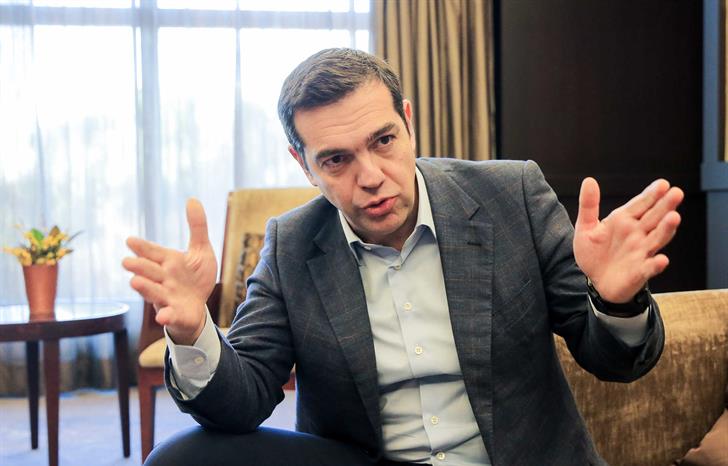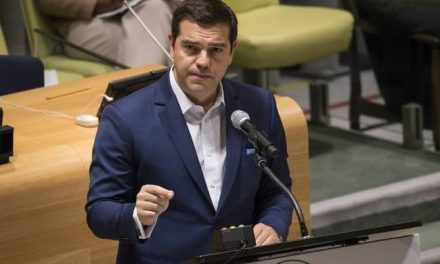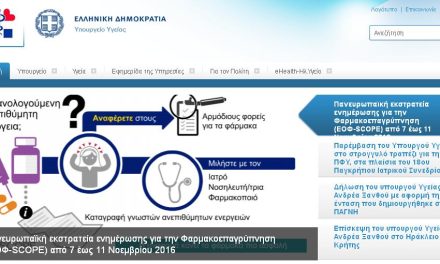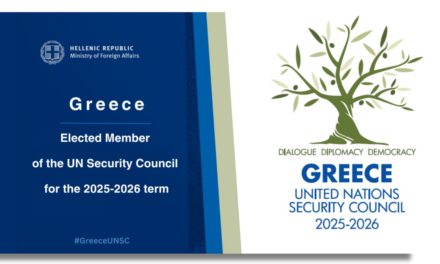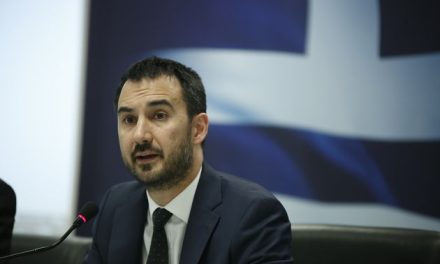Democracy and accountability are decisive issues for the future of Europe Prime Minister Alexis Tsipras said in an interview with Portuguese paper “Diario de Noticias” published on Sunday 3.12.2017 (“O governo português é o modelo para a Grécia quando sair do memorando”), noting that the Greek government seek “to make the people feel in its everyday life the impact of economic recovery, more jobs, social justice, fair and inclusive growth.”:
In 2018, Greece will exit the third bailout program. This is a victory for the Greek people. But do you think it is also a personal victory of yours, as Prime Minister?
Primarily, this is a victory of the Greek people. It may be justice personally for me, as well, but I think politics is a collective function. I believe that exiting the program, while protecting those who are socially vulnerable and preventing the destruction of our country, is something that belongs to the entire Greek people and not to a certain government. And the message it conveys is that when people resist to the policies implemented, only then the correlation of forces in Europe can change. In fact, the successful completion of the program and the exit from the memorandum are related to the participation of the Greek people in political developments during the summer of 2015. Do not forget that we were in a difficult crisis, a crisis that was both financial and, at the same time, a crisis of democracy or the lack of democracy. We gave people the right to make a decision through the referendum. Following this and many difficult commitments, we asked for their opinion in the early elections of September 2015. For the first time, the elections were held after a difficult agreement. The previous governments used to decide on the agreements always after the elections. We did the opposite.
Are you optimistic about the next elections scheduled for 2019 that you will renew the popular mandate or do you believe that it is rather difficult for a government to achieve this after the struggle with such austerity?
The first period after the 2015 election was difficult. But it was crucial for the completion of difficult agreements that introduced the necessary reforms. The adjustment was, of course, smoother than in previous years, but it did not cease to be an adjustment. And this had to be done because there was no other way to exit the memorandum and regain our dignity, and our sovereignty. And we made the necessary changes for the good of the Greek people. I believe that, now, during our term of office, we are at a crucial turning point. The political climate is beginning to change – rather fast – in Greece. I am absolutely certain that when we succeed in exiting the memorandum, in the summer of 2018, the psychology of the people will change. If you asked the Greeks today if they believe that this will happen, the majority, tired after seven years of memoranda, may have answered negatively.
But when this is a reality, psychology will be drastically improved. I want to believe that at the end of our mandate, the comparison will be made between the results of previous governments and the results of ours.
When we took office, unemployment was 27% and now it is at 20% – which is, of course, still high. But I believe that in September 2019, when we have the election, it will fall below 17%, which means that we will have managed to reduce it more than 10 percentage points. This is a significant result. On the other hand, our intention is not to minimize only the consequences of the crisis and to achieve a positive exit from the memorandum, but at the same time to achieve the recovery of the Greek economy and not only to improve financial figures. We also want to improve social indicators. We seek to make the world feel in its everyday life the impact of economic recovery, more jobs, more social justice and fair and inclusive growth. Occasionally, numbers are positive, but people’s lives remain negative. Therefore, our intention is to improve the everyday life of citizens.
How do you see the future of the relationship between Greece and the EU, and I do not mean only the financial aid but also the solidarity regarding the migratory flow arriving from the Aegean Sea?
I am a little anxious about the developments in Europe. I believe that Europe confronted the crisis in the worst manner. During the crisis, neoliberal ideas prevailed in the majority of governments. This is why a poor strategy was followed, causing many wounds in the social body of Europe, not only in the countries of the South but also in the European North. I think there are structural functional problems generating inequalities. So, after the crisis, inequalities have, unfortunately, increased and now we are facing a situation that requires brave decisions. As a result of all this, the EU has become less attractive for its peoples, for young people, for workers. But the worst was the rise of the far right. This is a major threat to Europe in the near future. I am worried because there are many divisions and inequalities between the Member States and within each country within our societies. We have divisions that have been caused, for example, by far-right governments in Eastern Europe. Therefore, it is necessary to rediscover our founding principles and values, related to solidarity, social justice, equality and democracy. I believe that the most important problem in Europe has to do with the deficit of Democracy. In the refugee crisis we witnessed all of this. Some countries believe that the refugee crisis is a problem that does not concern them and concerns only the initial countries of reception. But this is not a local crisis, but a European one and, I would say, a global crisis. It is the largest immigration crisis since the Second World War. Unfortunately, our country has been at the heart of two parallel crises, economic and refugee.
We have been obliged to carry the burden of the whole of Europe. Especially in our islands the situation was and remains very difficult. And when Europe had to show its solidarity, it showed its toughest face. It closed borders and at the same time some northern and eastern European countries said it was not their duty to help Greece. I believe that Europe cannot achieve progress without solidarity and I find it absolutely unfair to have very strict economic rules and mechanisms to control their implementation and at the same time there are some who want Europe to have benefits but without any obligation, without contributing to the common goal, which is the future of Europe. I believe that this is the most important issue that we should be concerned with in the debate on the future of Europe.
After Brexit, France and Macron will be the only counterweight in an EU dominated by Germany?
This is a long discussion. First of all, I believe that the Germans must realize that their future does not go through the creation of a German Europe but of a European Germany. Secondly, I believe that the future of Europe is linked to the cooperation between equal Member States. The problem is that we had some institutions that did not work in the institutional sense. The most important decisions were taken behind closed doors. For example, Eurogroup, perhaps the council where the most important decisions are taken in Europe, has never functioned institutionally. I want to say that the European Council is an institution, all the leaders of the countries have equal rights of time and vote, but Eurogroup is not an institutionally regulated body, it has an institutional deficit.
Do you see any change if the Portuguese, Mário Centeno, is the next president?
Yes. Actually, the problem is not only that the president of Eurogroup has made mistakes. The problem is its operation. For example, during the sessions of the Eurogroup, decisions are taken without being documented, without knowing details of what had been discussed there. This is important for the operation of the European institutions. Centeno, of course, is a very promising candidate. And the first thing that needs to be done is to create more transparency in the functioning of the Eurogroup, in order to ceasing taking decisions behind closed doors. Over the past eight years, Eurogroup has been a council where Europe’s ministers of finance have been discussing at length, but ultimately the decision was what the German finance minister, Mr. Schäuble, wanted to do. The decisions almost always echoed Germany’s intentions. This is the reality.
In my opinion, the most decisive issue in the debates on the future of Europe is Eurogroup, ESM, the European institutions in general, operating in a democratic manner and being accountable. The president of Eurogroup, the president of ESM, must be subject to public scrutiny and to an institution elected as the European Parliament or why not, under the control of a parliament of the Eurozone countries, a new institution. I want to say that the biggest deficit in Europe is the lack of democracy. The biggest problem is that technocrats have assumed the role of politicians. Politicians, even if we disagree with them, at the end of the day are subject to the control of the people. They must be accountable to them at the elections. Technocrats are not accountable to anyone. This is the problem. And in this context, if ESM that will replace the IMF operates in the same way, that is, not to be accountable to anyone, then I am afraid that we will have the same negative effects.
Is it a problem for Europe the lack of a center-left power at this moment?
The lack of credibility of left-wing forces is a problem for Europe. The fact is that the Social Democrats lost their credibility and, in one way or another, adopted the same positions as conservatives and neoliberals, this is the cause of their loss of power in Europe, and at the same time is the reason why there is not a balanced European leadership today. And the EU at the same time lost its credibility and the ability to inspire citizens. I believe that social democracy, the center-left in general is going through a serious crisis. I think the time has come to think outside the trivial. Maybe the time has come to create something new. We need something more radical in terms of proposals and positions in order to make changes to substantive issues for the benefit of the many. But, at the same time, we need a clear European strategy.
At this moment in Europe we have three streams of ideas. The first is the one of neoliberalism, those who still believe that everything should be settled by the dynamics of the markets. And markets can solve all problems. I believe it has been proven in practice that this has never happened. Actually, the result was an increase in inequalities. This is the biggest stream of ideas in Europe.
The second stream of ideas consists of those who believe that the problem is the refugees, weak social groups and that their presence creates difficulties in Europe, which is why we have to isolate them. They are the forces of extreme right and nationalism, racist and xenophobic powers.
And the third stream is that of the Left. That is, the forces that believe in the need to create a fairer Europe for the benefit of the many. I believe that so far in the spectrum of this third stream, fragmentation, a fragile and divided situation prevails. There are many pieces without unity. We must try to find a common basis despite our existing differences. Socialists, radical left-wingers, communists and greens need to find common ground. In order to support specific actions aimed at reducing inequalities and creating a fairer EU.
How do you comment on the economic recovery in Portugal and on the Portuguese solution linking different leftist forces?
For us, Portugal is a positive example and, above all, due to the collaboration of different leftist progressive forces. One of the disadvantages of the Left is that its forces are almost never working together, which is why Portugal is a great example of cooperation. But it is something else as well. The fact that Portugal has overcome the crisis with very good economic performances, having created space for the support for the most vulnerable through social policies, is an example to emulate, a good left success story. It showed us the way to follow the same path.
Portugal can be an example for Greece?
Yes, that is what I am telling you. The Portuguese government has opened the way that Greece can follow when it exits the memorandum. The fact that António Costa managed to do this, is important to us. I know that in Greece with a government that is not social democratic but is a radical left one, we will have more difficulties with the European establishment to implement policies for the many and social policies. The fact that Antonio Costa has managed to do this, it is good for us because it provides precedent, paving the way for us to be able to do the same without the institutions being able to deny it. For example, to increase wages, to restore labour relations, collective agreements.
I appreciate very much what António succeeded in doing with the collaboration of the Block of the Left and the Communist Party in Portugal. It is crucial not only for Portugal but for all of Europe. In this difficult struggle for the future of Europe, we have worked very closely to promote progressive positions that offer a prospect of regaining parity and social cohesion in Europe. This is the most important struggle for our common future.“
Read also via Greek News Agenda: Fighting inequality from the position of a left-wing governmental responsibility
N.N.

